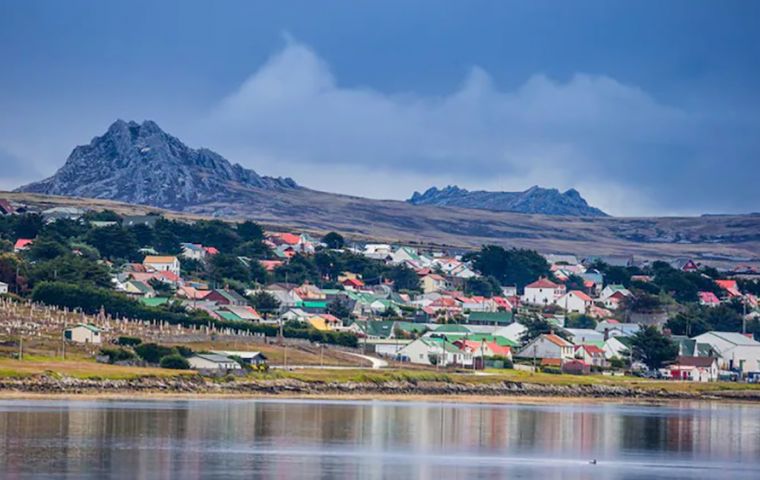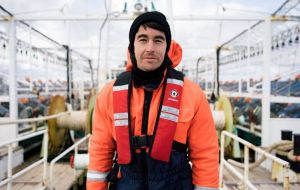MercoPress. South Atlantic News Agency
“What is life like on the Falkland Islands today?”, Sunday Times
 Thanks to fishing revenue and oil exploration, the Falklands are now considerably wealthier per capita than Britain, and just as cosmopolitan
Thanks to fishing revenue and oil exploration, the Falklands are now considerably wealthier per capita than Britain, and just as cosmopolitan  'None of these changes would be possible without the war and the exclusion limit,' says James Wallace, chief executive of Fortuna, the largest fishing company on the island
'None of these changes would be possible without the war and the exclusion limit,' says James Wallace, chief executive of Fortuna, the largest fishing company on the island The Sunday Times couldn't be absent of an event such as the fortieth anniversary of the Falklands War and this weekend published an interesting, informative long piece, under the title of “What is life like on the Falklands Islands today?”. The article by Josh Glancy emphasizes on how much the once withering sheep farming Islands have advanced since Liberation from the Argentine invasion, and prospects for an even more self sufficient dynamic community.
Follow some excerpts from the article:
“The Falklands are an altogether different proposition today, though. War changed everything. It was a tragic and shocking affair, but in its wake came prosperity and growth. The conflict generated unprecedented economic support from Britain, but also gave the islanders a future to believe in and a point to prove. Thanks to fishing revenue and oil exploration, the Falklands are now considerably wealthier per capita than Britain, and just as cosmopolitan. The capital, Stanley, has about 60 nationalities represented according to the last census; higher education is free for all; land is almost entirely locally owned and not by British investors. The islands’ population has doubled since 1982 and is now about 3,600. Argentina’s claim hasn’t gone away — it still refuses to recognise or trade freely with the Falklanders, but despite this the Kelpers are booming.
”Fisheries which now accounts for about 65 per cent of the Falklands’ GDP, has always been present in waters around the Islands, but it was only in the aftermath of the war that Britain acceded to Falklanders pleas to set up a 180-mile fishing exclusion zone, which means any fishing in the area must be licensed by the Falklands. Prior to the war Britain had been fearful of offending Argentina, but from the moment the zone was established in 1986 the Falklands’ days as a giant indigent sheep farm were over. More than 200,000 tons of fish were caught in its waters in 2019, most in the form of illex or loligo squid, also known as “Falklands calamari”. Chilean toothfish and hake are also plentiful.
“Falklanders don’t fish much themselves, but licenses sold to fleets of Spanish, Korean and Taiwanese “jiggers” bring in big money: in 1974 the GDP of the islands was £2.7 million. Today it is about £200 million, making Falklanders around the fifth or sixth richest people in the world per capita, right up with Luxembourg and Qatar. This is nearly double the UK’s average wealth and nine times Argentina’s, which you can imagine doesn’t go down too well in Buenos Aires.
”One thing that’s immediately apparent in the Falklands is that there’s simply no pro-Argentina sentiment at all. None. One might hear the occasional rumbling about greater autonomy from Britain and “paying our own way”, but absolutely nobody in the Falklands, left, right or centre, old or young, of British, Chilean or even Argentine origin, has the slightest interest in being occupied by their closest neighbor. In a 2013 referendum on the subject all but three voters elected to remain a self-governing British overseas territory. (No one seems to know who exactly the three renegades were.)“
”Alongside the fish there are considerable oil reserves offshore that could deliver about 1 billion barrels of oil, pouring vast sums into the Falklands coffers and allowing for much-needed infrastructure upgrades. Oil extraction faces logistical and political obstacles, but an Israeli company, Navitas, has signed up to pursue the project. With Europe turning away from Russian energy, this new pot of gold may yet emerge.
“'None of these changes would be possible without the war and the exclusion limit,' says James Wallace, 41, chief executive of Fortuna, the largest fishing company on the island. Wallace and his father are among the “squidionnaire” fish barons who have reaped the rewards of the maritime boom. “This was not a wealthy place in the late 1970s,” he says. 'People were moving away from the islands.'”




Top Comments
Disclaimer & comment rules-

-

-

Read all commentsIts Good to see the Islanders Prospering so well especially when compared to Argentina and the failing Regime they call a Government!!!
May 09th, 2022 - 02:32 pm +4Capizzzzzzzzzzzz !!
There is no “endemic problem of child sexual abuse”. That'll probably be why there is no mention.
May 09th, 2022 - 12:55 pm +3Ptyanga,
May 09th, 2022 - 10:50 pm +3The reason the team were thrown out of the 3 big farms was simple- they had broken their word in what terms had been agreed when they first arrived - it was pointed out to them that on the farms today there is nobody who was there when the incidence occurred so nobody to try and get to spill some beans. Just maybe a bit or hearsay 3rd or 4th hand and twisted over the years and irrelevant as evidence.
Frustrated ITV then seized on the Underage Sex issue- Yes - but similar to what occurred in many small remote communities- Scottish Islands included- Channel Is as well. Thankfully all now well under control and good Social Services set up that kids can turn to
which was of course not available back then.
Funny ITV never mentioned any of the above?- well of course not - they wanted to create a juicy story that was not in fact reality.
Commenting for this story is now closed.
If you have a Facebook account, become a fan and comment on our Facebook Page!